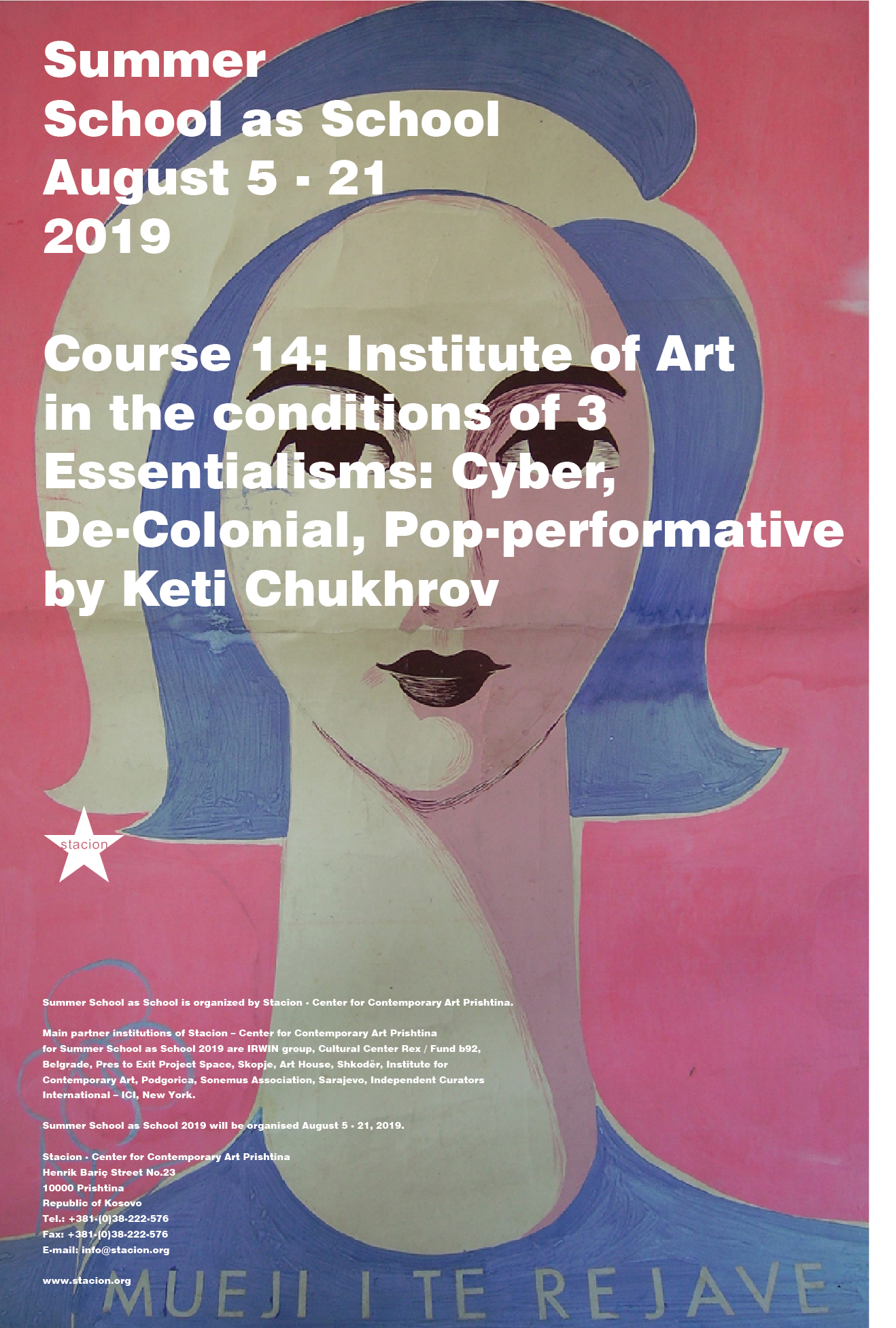
Course 14: Institute of Art in the Conditions of 3 Essentialisms: Cyber, de-Colonial, pop-performative
by Keti Chukhrov
19 – 21 August, 2019
Course description
This course explores the consequences of the critique of enlightenment on the territory of contemporary art that resulted in three recent principal tendencies: 1. cybernetic reconsideration of sociality, 2. De-colonial critique of universalisms and 3. a new performative turn that differs epistemologically from the one in 1960s and 1970s. These recent inscriptions in art and theory happen to be the outcomes of the rejected legacies of enlightenment and the humanities on the one hand, and on the other, of the supersession of universalist discourses of philosophy and culture by science, media and technology. The fierce defiance of enlightenment was none the less important in 1960s and 1970s; however, if in 1960s it became a negativist paradox, forming the conceptualist quasi-dadaist paradigms of art, nowadays we witness the indifference and amnesia in regards to the negation of enlightenment, in other words – the loss of the loss.
Prerequisites: students have to be familiar with the basic provisions of the aesthetics of Modern Time.
Lecture 1. Obsessive Calibanism
According to Adorno, enlightenment proved to be rather an instrumentalized rationality than the project of generic reason and cultural universalism, grounded in equality. In the frame of the post-philosophies (theories of computation, technology, media, Actor-Network Theory), critique of enlightenment becomes even more severe in exposing enlightenment’s fictitiousness. Yet in all these post-adornian techno-scientific as well as de-colonial accusations, enlightenment is denounced not for the failure of thought and the project of universal culture (as it would be for Adorno), but conversely, for its still-remaining aspirations, cherishing pretensions for reason and thought. Culture in this context acquires an important role as the operator of universalization, which is either fervently defied, or, on the contrary, used as the mode of humanitarian generalization and commons (as was the case in socialist, Marxist aesthetics).
Lecture 2 Art's Negative Genealogy
Contemporary art formed itself due to radical turnover of the epistemes of aesthetics, bringing itself to self-sublation. This negative genealogy of art is the reason for its global power and domination. Interestingly, the so-called “performative turn” that sought to bring vitality to and deconceptualization of art's rigidity didn't succeed in 1960s and 1970s. Performative practices remained conceptual exhibits, thus enhancing art's power and its negativity. Art does not need theory, because it is itself theory. Art lost body, but it didn't lose its territory even though it has ever-remained empty. Yet in its illusions about art's emancipatory role and confusion with art's negative attitude to enlightenment, art started to deplore its negativity and rigidity. Consequently, it surrendered to applied practices of digital design, de-colonial folklore and search of enjoyment in performative practices: dance, sound-art, theatre, etc, confusing such expansions with democratization.
The question to investigate then is what the social and institutional demands for such indistinction are and whether this indistinction lubricates, or on the contrary, articulates the political horizons of contemporaneity.
Biography
Keti Chukhrov is ScD in philosophy, an associate professor at the Department of Сultural Studies at the National Research University Higher School of Economics. Currently she is a Marie Sklodowska Curie fellow in UK, Wolverhampton Un-ty. She has authored numerous texts on art theory, culture, politics and philosophy. Her full-length books include: To Be—To Perform. ‘Theatre’ in Philosophic Critique of Art (Spb: European Un-ty, 2011), and Pound &£ (Logos, 1999) and a volume of dramatic writing: Merely Humans (2010) and War of Quantities (2003). Her research interests and publications deal with: 1. The impact of socialist political economy on the epistemes of historical socialism, 2. Philosophy of performativity, 3. Art-systems and 4. Neo-humanism in the conditions of post-human theories. Her forthcoming book deals with the communist epistemologies in the Soviet Marxist philosophy and culture of 1960s and 1970s. With her video-play “Love-machines” she participated at the Bergen Assembly (2013) and “Specters of Communism” (James Gallery, CUNY, NY, 2015). Her Latest video-play “Communion” was at the Ljubljana Triennial U-3 “Beyond the Globe (2016, cur. B. Groys).
Participation
10 participants will be selected to participate in this course. Eligible participants must read the Terms, fill out the application form, upload the required documents and submit the application form. Incomplete applications will not be considered.
Scholarships are available for participants from Kosovo.
A limited number of scholarships, that cover the participation fee, are available for international participants.